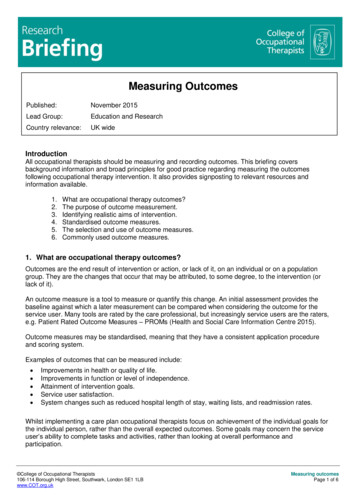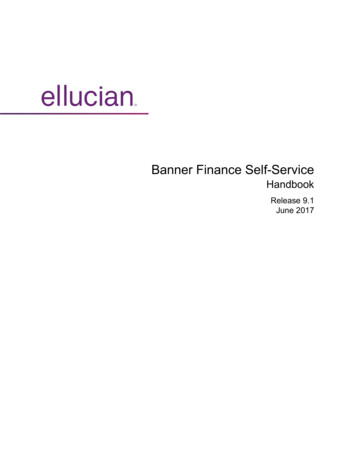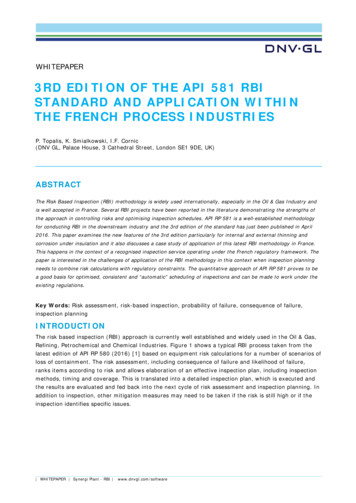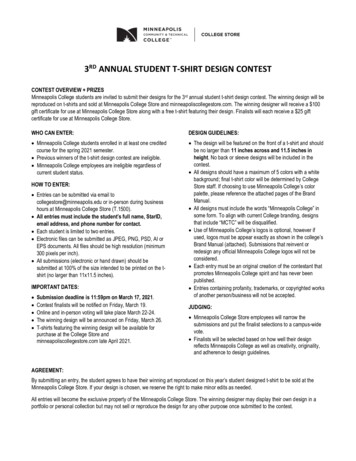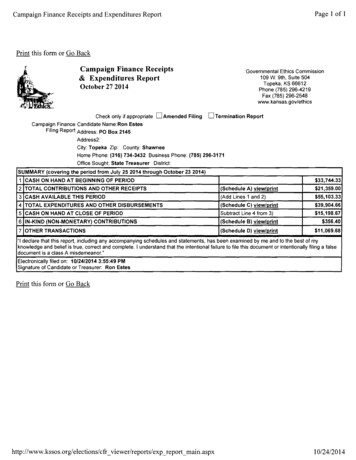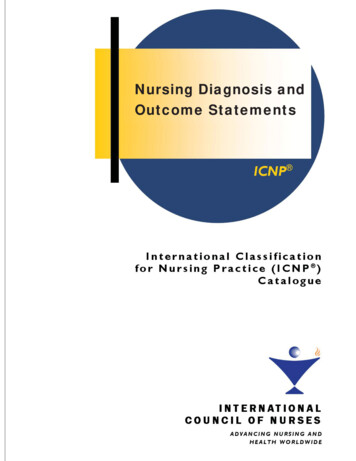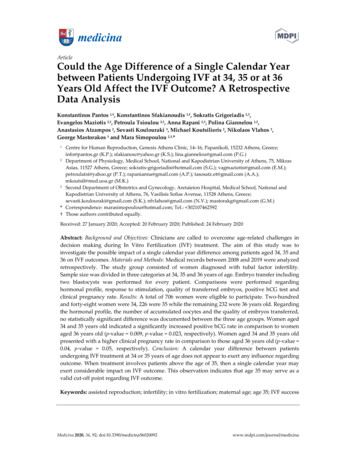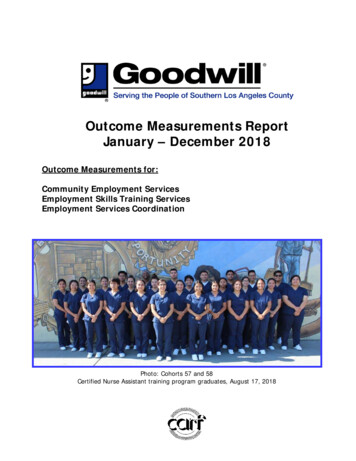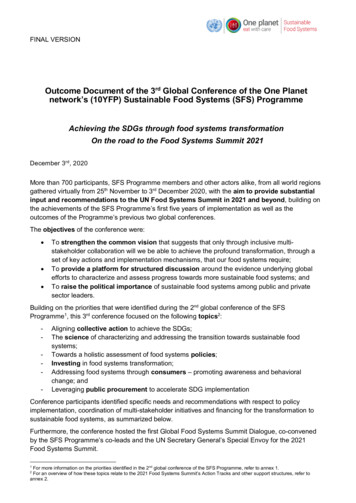
Transcription
FINAL VERSIONOutcome Document of the 3rd Global Conference of the One Planetnetwork’s (10YFP) Sustainable Food Systems (SFS) ProgrammeAchieving the SDGs through food systems transformationOn the road to the Food Systems Summit 2021December 3rd, 2020More than 700 participants, SFS Programme members and other actors alike, from all world regionsgathered virtually from 25th November to 3rd December 2020, with the aim to provide substantialinput and recommendations to the UN Food Systems Summit in 2021 and beyond, building onthe achievements of the SFS Programme’s first five years of implementation as well as theoutcomes of the Programme’s previous two global conferences.The objectives of the conference were: To strengthen the common vision that suggests that only through inclusive multistakeholder collaboration will we be able to achieve the profound transformation, through aset of key actions and implementation mechanisms, that our food systems require;To provide a platform for structured discussion around the evidence underlying globalefforts to characterize and assess progress towards more sustainable food systems; andTo raise the political importance of sustainable food systems among public and privatesector leaders.Building on the priorities that were identified during the 2nd global conference of the SFSProgramme1, this 3rd conference focused on the following topics2:-Aligning collective action to achieve the SDGs;The science of characterizing and addressing the transition towards sustainable foodsystems;Towards a holistic assessment of food systems policies;Investing in food systems transformation;Addressing food systems through consumers – promoting awareness and behavioralchange; andLeveraging public procurement to accelerate SDG implementationConference participants identified specific needs and recommendations with respect to policyimplementation, coordination of multi-stakeholder initiatives and financing for the transformation tosustainable food systems, as summarized below.Furthermore, the conference hosted the first Global Food Systems Summit Dialogue, co-convenedby the SFS Programme’s co-leads and the UN Secretary General’s Special Envoy for the 2021Food Systems Summit.1For more information on the priorities identified in the 2nd global conference of the SFS Programme, refer to annex 1.For an overview of how these topics relate to the 2021 Food Systems Summit’s Action Tracks and other support structures, refer toannex 2.2
FINAL VERSIONThe conference participants recalled the Ministerial Declaration of the 2018 High-level PoliticalForum on Sustainable Development (HLPF), recognizing the One Planet network as an importantimplementation mechanism for the Sustainable Development Goals (SDGs), and calling upon allstakeholders to adopt a sustainable food systems approach to promote sustainable consumption andproduction.The conference participants further recalled the Ministerial declaration of the United NationsEnvironment Assembly at its fourth session, where Member States affirmed they will “promotesustainable food systems by encouraging the implementation of sustainable and resilient agriculturalpractices, improving value generation, and significantly reducing waste and energy use along thefood supply chain to help ensure food security and ecosystem functions and services.”The conference participants stressed the urgent need to accelerate progress towards theachievement of the SDGs by 2030, and highlighted the important contribution that a sustainablefood systems transformation can make in that regard. In this context, they acknowledged theimportance of the UN Secretary General’s first ever UN Food Systems Summit in 2021, toconsolidate evidence, knowledge and understanding about interconnections, interactions and tradeoffs in food systems and to engage with diverse stakeholders in identifying opportunities forimproved collective action at the territorial, national, regional and global levels.Conference sessions chairs’ summary and recommendationsThis section includes recommendations issued by each of the conference’s sessions as summarizedby session chairs. The conference sessions were conceived with the aim of providing substantialinput to the 2021 Food Systems Summit. Thus, the recommendations are addressed primarily tohigh-level political leaders, decision-makers, business leaders, but also to food systemsstakeholders at large, who should take the opportunity of the keystone 2021 Food Systems Summitto take urgent action on their implementation.Aligning collective action to achieve the SDGs Food systems should be embedded in all relevant multilateral frameworks (e.g. fromclimate change to biodiversity), through relevant and assignable targets that are specific,measurable and time-bound, and acknowledging the need of a holistic approach. Countries and other actors working on different multilateral frameworks that have anexus through food, should actively coordinate to ensure policy coherence. A rights-basedapproach to food systems should serve as a guiding framework. All levels of government should seek to coordinate food systems decision-making andaction through the creation of appropriate institutional arrangements or by strengtheningexisting governance mechanisms for policy coherence. The creation of participatory multi-stakeholder mechanisms can both support coordinationefforts as well as incorporate collective knowledge, demands and perspectives that maycontribute to the assessment of trade-offs and establishment of priorities in food systemstransformation. Collective action to move towards sustainable food systems should be participatory, inclusive,and broad-based. Food systems governance should address current power imbalances,and actively work to engage the most marginalized food systems stakeholders indeveloping solutions.
FINAL VERSIONThe science of characterizing and assessing the transition towards more sustainable food systems Food systems are dynamic and what we think is sustainable today may no longer besustainable in the future. It is important to keep a productive dialogue between scientists,practitioners and policy makers in order to ensure that constant progress can be madetowards more sustainable food systems. Standardized indicators and models to measure sustainability in food systems should becomprehensive, while meeting both scientific rigour and intuitive simplicity in order toensure that they will be used in policy and practice. Trade-offs, at different points in time, need to be identified and seriously considered inorder to inform policy decisions. Successful evaluation and management of trade-offs requires active inclusion of allstakeholders throughout the process and policy design.Towards a holistic assessment of food systems policies Food systems transformation processes require the highest level political commitment asthey are complex and dymanic. Many trade-offs need to be addressed and policy choices made. Food systems transformation in support of the SDGs at national and sub-national level requirespolicies that promote sustainability along the entire value chain, taking into due accountthe social (including culture and health), environmental and economic dimensions ofsustainable development. Such policies need to be designed with a holistic approach, linking areas such asagriculture, nutrition, environment, health, trade, etc., at multiple levels. Facts, interests andvalues need to be carefully balanced in order to successfully address conflicting goals and tradeoffs between these areas, within the overall framework of promoting the realization of the right tofood. Conflicting goals and trade-offs can be best addressed by establishing and/or actively linkinginclusive multi-stakeholder bodies that are representative of all relevant actors in the system,at multiple levels, to the policy-making process.Investing in food systems transformation Private investors, philanthropies, banks, and bi- and multilateral funders should redirectfinancial flows away from harmful practices, use their resources to catalyze opportunities insustainable food systems and work together to better align public and private finance,creating greater impact. Financing models and products should be developed to support viable business models forfarmers, cooperative enterprises, and value chain enterprises using or transitioning tosustainable practices (e.g. through innovative approaches including agroecologicalapproaches and regenerative agricultural practices3). Concepts such as true cost accounting and associated tools (i.e., TEEBAgFood) shouldbe used to identify investments that increase positive outcomes in food and agriculture. National governments should address systemic barriers to catalytic finance (e.g. governance,3For definitions of terms including agroecological systems and regenerative agriculture, refer to:Sustainable Food Systems Programme. 2020. Towards a Common Understanding of Sustainable Food Systems. Available files/sfs programme glossary towards a common understanding of sfs 2020.pdf(Accessed: 2 December 2020)
FINAL VERSIONsubsidies and other policies, balance of power, institutional alignment) and create an enablingenvironment for ambitious, integrated capital investment in their respective contexts, whichrespond to the needs of all food systems stakeholders, in particular the most vulnerable ones.Addressing food systems through consumers – promoting awareness and behavioral change Ensure that consumers are engaged as active players in the food system and theirperspective is effectively taken into account in the transition to sustainable food systems. Promoting consumer information and education are key ingredients for enabling consumerawareness and behavioral change. Information should be communicated in ways that consumers can process quickly and intuitivelyat the moment of making their food choices. Therefore, there is a need to promote the use oftools to communicate sustainability information on food products and services in areliable and clear way, such as the UNEP/ITC Guidelines for Providing Product SustainabilityInformation or credible (type 1) ecolabels.Leveraging public procurement to accelerate SDG implementation Work with all stakeholders to leverage public food procurement’s huge potential for nurturingpeople and the planet. Promoting the production, distribution and consumption of sustainableand healthy meals while providing a market share to small food suppliers. Prioritize the education system as a setting for sustainable and healthy food systemtransformation. School meals should serve as a triple-duty action to prevent childhoodundernutrition and overweight/obesity, as well as protect planetary health. They can achievesustained impacts on human and planetary health by encouraging children to developsustainable, healthy food preferences throughout their lives. Governments should implement laws and sustainable procurement policies that stipulateboth nutritional and sustainability procurement requirements for school meals. An important immediate next step would be to confirm joint recommendations, targetsand indicators to inform the design of school meal programmes which serve as a tripleduty action to prevent undernutrition and overweight/obesity while protecting planetary health. As a game-changing solution, the 2021 Food Systems Summit process should promote thedevelopment of a global framework for action to ensure sustainable and healthy schoolmeals for all school age children, leaving no child behind.The conference calls upon all countries as well as other relevant stakeholders, to implement theabove recommendations in their own national contexts, and to introduce them into other relevantforums and policy processes, including the UN Food Systems Summit in 2021 and its five ActionTracks and other support structures.
FINAL VERSIONANNEX 1: Priority areas as identified in the 2nd global conference “San José”Call to Action of the SFS Programme: Evidence-based advocacy to promote context-specific and holistic policies includingincentives and disincentives for sustainable consumption and production (labeling, taxes,subsidies, etc.). Produce metrics and data, and establish monitoring and evaluation mechanisms to assessthese policies. Leverage the potential of public procurement to accelerate the shift towards more sustainablefood systems. Promote behavioral change and consumer awareness through education and hands-onlearning; focusing on school-aged children and youth as key agents of change. Encourage a shift towards healthier and more sustainable food environments together withprivate sector including SMEs, informal market actors and farmers. Foster partnerships among food system actors, especially public-private partnerships formore coherent and targeted actions. Allocate existing sources of finance and mobilize additional (public and private) investmentsfor food systems transformation, particularly at local level (de-risking through blendedfinance, more aligned investments and grants).
FINAL VERSIONANNEX 2: Conference structure and linkage to UN Food Systems SummitThe 3rd global conference of the Sustainable Food Systems (SFS) Programme was structured alongthe priorities for collective work and multi-stakeholder action that were identified at the SFSProgramme’s 2nd global conference in Costa Rica in 2019. These priorities shaped the conference’ssessions. Each session produced a set of recommendations that aim to contribute to the process ofthe UN Food Systems Summit in 2021 (FSS21).Each conference session has linkages to the 2021 Food Systems Summit’s support structures andbodies, as follows:-Session titled “Aligning collective action to achieve the SDGs” links to the FSS21 Engament& Dialogues work stream.-Session titled “The science of characterizing and assessing the transition towards moresustainable food systems” links to the work of the FSS21 Scientific Group.-Session titled “Towards a holistic assessment of food systems policies” links to the FSS21Evidence & Policy work stream-Session titled “Investing in food systems transformation” links to the FSS21 Finance “leverof change”.-Session titled “Addressing food systems through consumers – promoting awareness andbehavioral change” links to the work of the FSS21 Action Track 2 “Shift to SustainableConsumption Patterns”.-Session titled “Leveraging public procurement to accelerate SDG implementation” links tothe work of the FSS21 Action Track 1 “Ensure Access to Safe and Nutritious Food forAll”.-Session 8 hosted the first Global Food Systems Summit Dialogue, which is an official part ofthe FSS21 Engament & Dialogues work stream.
The 3rd global conference of the Sustainable Food Systems (SFS) Programme was structured along the priorities for collective work and multi-stakeholder action that were identified at the SFS Programme’s 2nd global conference in Costa Rica in 2019. These prio
